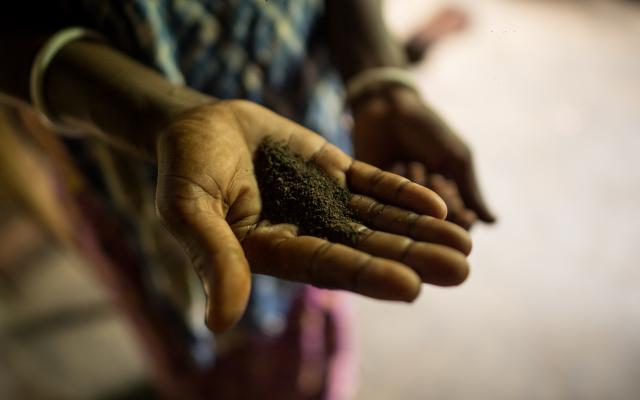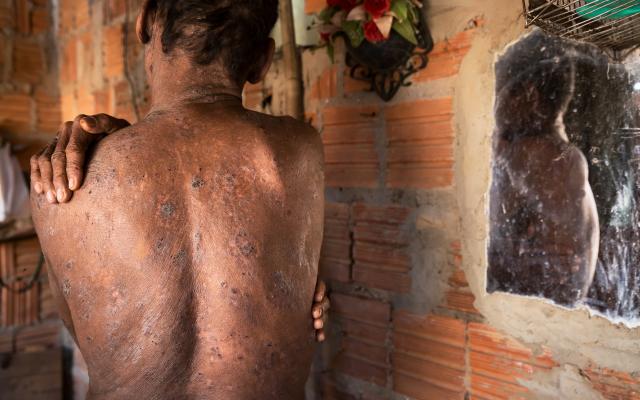
Women plucking tea leaves in Assam, India. Assam has the largest area under tea plantation in the world, and yet the labour conditions are one of the worst. Workers earn approximately $1.60 per day for picking and carrying a back-breaking 24kg of tea leaves per day. Photo: Roanna Rahman/Oxfam
The global health crisis highlights the fragility of our food system. Food workers throughout global supply chains are on the frontline of the coronavirus. Behind the food that normally fills supermarkets shelves are the hidden workers who produce, pick and pack our food. The pandemic adds another crisis onto the almost permanent state of economic crisis in their lives.
Now more than ever supermarkets and their suppliers must uphold and protect the rights of all the workers and producers who are risking their lives to fill supermarket shelves.

Since 2018, Oxfam’s Behind the Price campaign has been influencing supermarkets and governments to improve their policies and practices to protect these hidden workers. Oxfam research found that low wages, unacceptable working conditions and unstable contracts often mean that workers are living in poverty, unable to access food and other basics like healthcare and education.
Deeply entrenched gender norms mean the impact is most severe on women: denied the right to own land, less likely to enjoy trade union representation, shouldering most unpaid care work, facing discrimination over pay and progression to more senior roles, and the threat of sexual harassment and violence. (Photo: Maria, fruit worker in Brazil. Credit: Tatiana Cardeal/Oxfam)
Increased poverty and suffering for food workers
Around a third of all global food trade comes from low and middle-income countries. Food workers in these countries are particularly vulnerable to the effects of coronavirus. In 2019, Oxfam met with tea plantation workers in Assam, India. They earn approximately $1.60 per day for picking and carrying a back-breaking 24kg of tea leaves per day.
Since the Indian lockdown started 25th March, Oxfam India has been working with partner organisations and unions to understand the impact on tea pickers. Worker unions have reported that tea pickers are facing increased hardship, hunger and health-risks due to the lockdown.

Though tea workers toil to bring us the tea that we relish, they hardly get any share of it, a monthly ration of about 300 grams of tea dust that is left behind and simply passes through the tea strainer. Photo: Roanna Rahman/Oxfam
Of the 14 tea estates that one union visited, no tea pickers have received wages for the lockdown period and only one estate has provided workers with their rice ration.
As tea picking has partially resumed on some tea estates, the union told Oxfam that plantation managers haven’t installed adequate handwashing and hygiene facilities. There are also limited quarantine and health facilities should workers fall ill.
Exposed to pesticides and fertilisers
In 2019, Oxfam met with Carlos (not his real name), who works on a tropical fruit plantation in North-Eastern Brazil which exports to European supermarkets. Carlos and other workers reported suffering from serious skin diseases as a result of working with pesticides and other chemicals without adequate protection.

Carlos shows the skin damage he reported was caused by chemical use on fruit plantations in North-Eastern Brazil. Photo: Tatiana Cardeal/Oxfam
Such chemicals can be known to cause respiratory problems, increasing the risks for those who will contract coronavirus. Oxfam partners in Brazil and Ecuador who work with fruit pickers have all reported the potential additional risks that workers face from coronavirus due to effects of long-term exposure to pesticides and fertilisers.
Small-scale producers, who often sell directly to markets, have already lost their customer base as markets across the world are closing. Here our colleague recounts how Delhi’s normally vibrant food markets have become eerily quiet as lockdown measures force them to close. As incomes are lost, food workers and producers are pushed further into poverty.

Banana farmers in Philippines face brutal working conditions as they try to meet strict quotas from large traders and multinational companies and are exposed to crop spraying and toxic pesticides. Photo: Larry Monserate Piojo
Travel restrictions
More than a quarter of the world’s farm work is done by migrant workers. Coronavirus restrictions mean that migrants are unable to travel to work. Across Europe, farmers are facing labour shortages due to such measures. Some countries are implementing import restrictions in attempts to both secure supply for their citizens and in the belief that this will help halt the spread of the virus.
France is one of those countries, posing threats to the livelihoods of food workers in Morocco, one of the countries France sources from. In the Philippines, farmers and food workers have faced checks and blocks to access their farms or workplaces even though as essential workers they are legally allowed to travel.
Supermarkets must act to protect workers
Supermarkets across the world are in over-drive to ensure consumers have access to food and other essentials. Supermarkets’ approaches have been mixed so far. UK retailer Morrison’s committed to paying its smaller suppliers immediately, to ensure cash flow. Meanwhile, in the USA, workers at Amazon, the parent company to US supermarket Whole Foods, have walked out due to lack of protective commitment.

Rosana Jano is a farmer from Sultan Kudarat, Philippines. Here, she arranges her harvested crops of string beans, Malabar spinach, and bitter gourd. It is because of farmers like Rosana that communities are able to feed themselves during times like these. Photo: April Bulanadi/Oxfam
There is hope
Migrant food workers who were once exploited in the citrus fields of Southern Italy are selling produce from their cooperative to feed Rome’s residents. Fairtrade has adjusted its Fairtrade Premium guidance to get more cash and protective equipment to people such as flower and banana workers. Across the world alternative food systems are springing up, helping to feed the most vulnerable, from mutual aid groups in the UK to hunger hotlines in India.
Oxfam is working with unions and other partners in food producer countries such as Ecuador and Brazil to urge supermarkets to ensure the safety of their workers. In the USA, Oxfam is urging supermarkets to provide protective equipment for their workers. In the Philippines, Oxfam is showcasing the #FoodFrontliners who are keeping the country fed. But no one is safe until everyone is safe, and that includes food workers too.
Francesca Carnibella, Food & Climate Campaign Manager
End the suffering behind your food
Join us to stand with frontline food workers who are risking their lives to keep food on our tables.